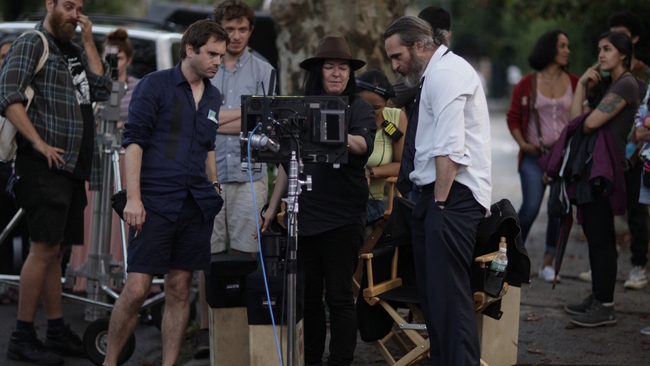Small Deaths
Lynne Ramsay, a Scottish filmmaker, is known for her distinctive approach to storytelling, where mood, sound, and imagery take precedence over traditional plot structures. With films like Ratcatcher (1999) and We Need to Talk About Kevin (2011), she has redefined the boundaries of psychological drama, focusing on intimate, often marginalized characters. Ramsay’s films are marked by their atmospheric qualities, nuanced portrayals of trauma, and the use of sound to deepen emotional resonance. Her unique ability to evoke complex human experiences with minimal dialogue has influenced a new generation of filmmakers, with directors like Ari Aster citing her as a key inspiration.
![]()
Ramsay’s work is characterized by its unflinching exploration of uncomfortable truths, often delving into the inner lives of characters facing isolation, grief, and violence. Through her fragmented narrative style, she challenges audiences to engage deeply with the emotional landscapes of her films. Her films are both haunting and intimate, inviting viewers to explore the complexity of human vulnerability. Whether depicting troubled youths or damaged adults, Ramsay’s films refuse to offer easy answers, instead offering a raw, unvarnished look at the human condition.
![]()
Her debut short film, Small Deaths (1995), offers a striking introduction to her cinematic style. The film follows a young girl caught in a world of neglect and confusion, using fragmented vignettes to convey the emotional turbulence of childhood. Ramsay’s deliberate pacing and evocative imagery establish a haunting atmosphere that lingers long after the film ends. Small Deaths introduces many of the themes that would define Ramsay’s later work, such as trauma, memory, and the fragility of childhood, while showcasing her talent for creating powerful emotional experiences through visual storytelling.
In Small Deaths, Ramsay forgoes conventional narrative in favor of capturing moments of emotional intensity, marking her as a filmmaker unafraid to tackle uncomfortable subjects. The film’s sparse dialogue and focused character study allow the audience to feel the girl’s internal turmoil, creating a visceral experience that foreshadows Ramsay’s future successes. Though brief, Small Deaths establishes Ramsay as a filmmaker with a unique voice, capable of turning subtle moments into emotionally charged reflections on the human experience.
![]()

Ramsay’s work is characterized by its unflinching exploration of uncomfortable truths, often delving into the inner lives of characters facing isolation, grief, and violence. Through her fragmented narrative style, she challenges audiences to engage deeply with the emotional landscapes of her films. Her films are both haunting and intimate, inviting viewers to explore the complexity of human vulnerability. Whether depicting troubled youths or damaged adults, Ramsay’s films refuse to offer easy answers, instead offering a raw, unvarnished look at the human condition.

Her debut short film, Small Deaths (1995), offers a striking introduction to her cinematic style. The film follows a young girl caught in a world of neglect and confusion, using fragmented vignettes to convey the emotional turbulence of childhood. Ramsay’s deliberate pacing and evocative imagery establish a haunting atmosphere that lingers long after the film ends. Small Deaths introduces many of the themes that would define Ramsay’s later work, such as trauma, memory, and the fragility of childhood, while showcasing her talent for creating powerful emotional experiences through visual storytelling.
In Small Deaths, Ramsay forgoes conventional narrative in favor of capturing moments of emotional intensity, marking her as a filmmaker unafraid to tackle uncomfortable subjects. The film’s sparse dialogue and focused character study allow the audience to feel the girl’s internal turmoil, creating a visceral experience that foreshadows Ramsay’s future successes. Though brief, Small Deaths establishes Ramsay as a filmmaker with a unique voice, capable of turning subtle moments into emotionally charged reflections on the human experience.


